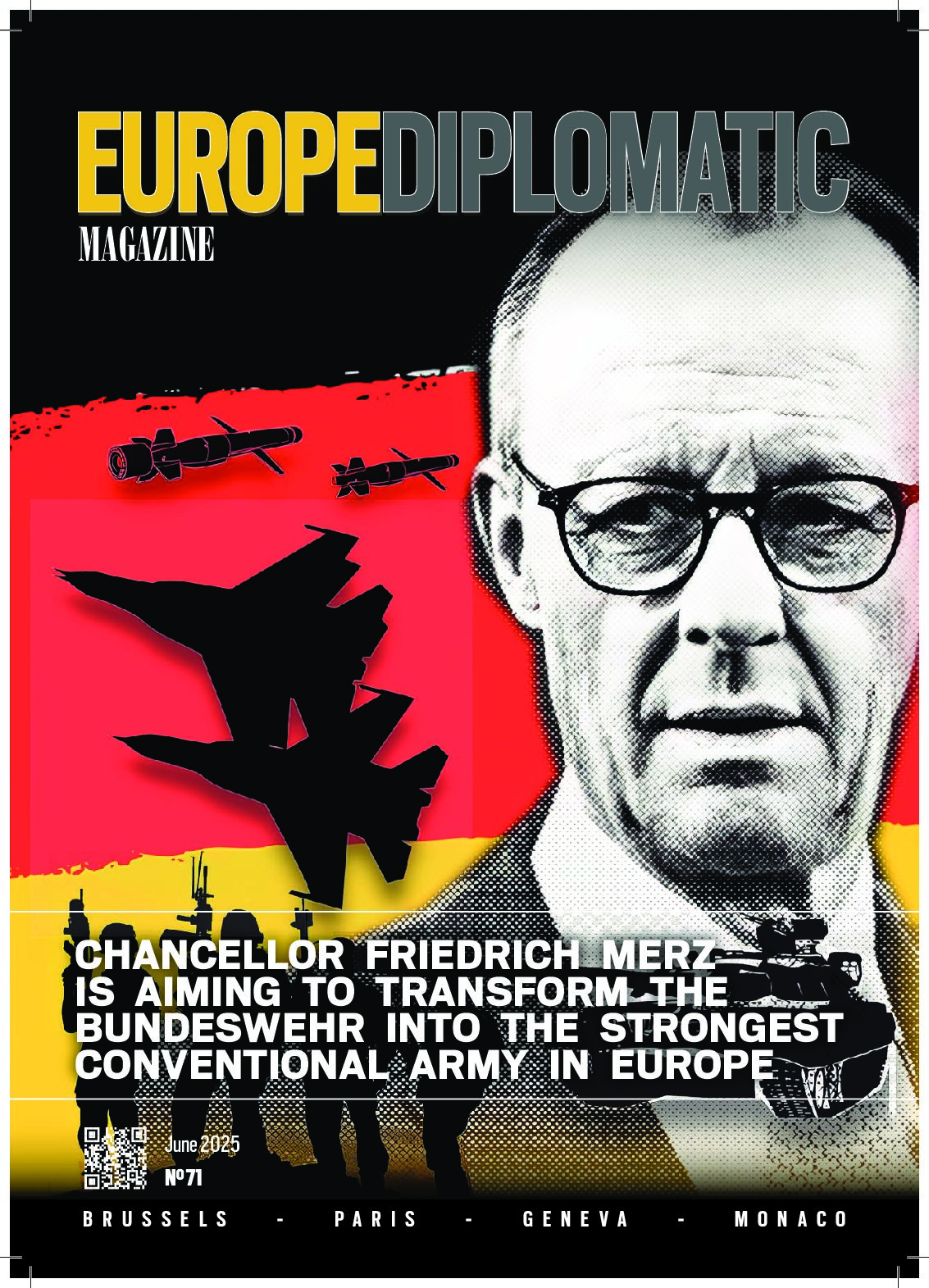Guy Verhofstadt © European Parliament
“The far right still love Putin,” wrote Belgian Liberal politician Guy Verhofstadt in a Facebook post, “They still want to be with him; They still want to be like him; They want to destroy everything he dislikes: Europe, democracy, freedom…” adding the warning: “Let’s never forget whose side they’re on!” There’s not much risk we’ll forget, as long as Mr. Verhofstadt is there to remind us (and Russian shells and missiles keep falling around us). Of the man himself and his various political speeches and statements there is no shortage. Britain’s prime minister, Boris Johnson, must hate him. The feeling may be mutual, especially since Johnson compared Ukrainian resistance to Russian attack with Britain’s bid to “escape” from the EU. During the messy manoeuvring for Britain to leave the Union, still known as Brexit, Boris Johnson compared himself and Britain with the comic book character, the Incredible Hulk, who always escaped, whenever and wherever he was trapped. It failed to impress Verhofstadt, who was the European Parliament’s co-ordinator on Brexit, and who wrote: “Even to Trumpian standards the Hulk comparison is infantile. Is the EU supposed to be scared by this? The British public impressed? Is this Boris Johnson whistling in the dark?” He may be out of tune, in that case. Even so, Johnson succeeded in leading his country out into the wilderness, where it has encountered problems that its cheerleaders never foresaw, but should have done.

The UK government’s response to discovering that agreements which it had proposed, negotiated, and to which it agreed and signed up to aren’t working is to discard them, regardless of the legal ramifications. The message seems to be that the best thing any negotiating partner can do with an agreement signed by the British government is to regard it as mutable and only as solid and long-lasting as an iced lolly on a sunny day. In more polite terms regarding the UK’s bid to break its own agreement on a trading protocol for Northern Ireland, three MEPs: David McAllister (EPP, Germany), Bernd Lange (Socialists, Germany) and Nathalie Loiseau (Renew Europe – Liberal – France), said in a statement after a meeting with Commission Vice-President Maroš Šefčovič, that it “constitutes a serious and unacceptable breach of international law”.
Verhofstadt is a fervent supporter of the EU and of the ideals that led to its foundation, but he has also been a fierce critic of its failings and its weaknesses. So, what of the man himself? Born in 1953, He studied law prior to joining and becoming an activist in the Association of Liberal Flemish Students before being elected president of the Flemish Liberal Party’s youth wing and, at the age of just 29, he was chosen by popular vote to be president of the Partij voor Vrijheid en Vooruitgang, the Flemish Liberal Party, becoming the youngest political party leader in Belgian history. He also practised for a while as a lawyer in Ghent, but it was politics that held his interest.
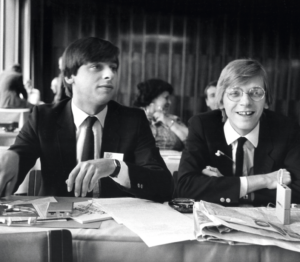
In the 1980s he served as vice-prime minister and Minister of Budget in a coalition government headed by the Christian Democrat, Wilfried Martens. In a kind of game of political musical chairs, having changed the name of the party to the Liberal and Democratic Flemish Party, in the hope of attracting more centrist voters, he defeated the centre-left coalition of Jean-Luc Dehaene to become Belgium’s first Liberal Prime Minister for more than six decades. The people liked him, and he was re-elected in 2003, although he failed in his bid to replace Romano Prodi as president of the European Commission. His government succeeded in legalising same-sex marriage, euthanasia, and the private use of marijuana. The party’s hopes were high (as, presumably, were some of its supporters).
When I was based in Brussels as a journalist accredited to the European Commission and all the other EU institutions, Verhofstadt was seen as the Union’s most daunting supporter, which makes the many references to him in, for instance, Britain’s more right-wing press somewhat rather surprising. It is, of course, his well-informed criticisms of the EU that they quote. They were very interested when Verhofstadt and MEP Sophie in ‘t Veld (like Verhofstadt, a member of the Renew Europe faction in the European Parliament) started collecting signatures for a motion of no confidence in European Commission President Ursula von der Leyen.
Their anger with her arises from the decision of her Commission to disburse what are called Recovery and Resilience Facility (RRF) Funds to help Poland to recover economically, but without Poland instituting the democratic restructuring most MEPs would like to see and Poland had said it would undertake. Instead, von der Leyen accepted the Polish National Reconstruction Plan just as it stands, despite Poland’s record of blocking some EU plans. For the no confidence vote to succeed (previous attempts related to different issues have failed), it will require the support of 71 MEPs. It all concerns the sum of €58-billion, which will be granted to Poland from EU funds in the form of €23.9-billion in grants and more than €34.2-billion in loans. From Poland’s perspective, it translates into 158.5-billion Polish zlotys. In a letter to MEPs, Mr Verhofstadt said the Commission “blatantly disregarded Parliament resolutions” on Poland’s capabilities to follow EU rules.

COULD DO BETTER
Those are words I dreaded seeing on my old end-of-term school report. Not quite as ominous as “see me” but clearly meant as a warning. In a letter to his fellow-MEPs, Verhofstadt expressed similar sentiments about the Commission’s approval of RRF funds for Poland, when he wrote: “The Commission decided to give a positive assessment, in blatant disregard of several Parliament resolutions, several ECJ (European Court of Justice) rulings, and dissent within the College, as five key Commissioners publicly doubt whether the so-called milestones are sufficient to comply with the ECJ rulings.” Moreover, these Commissioners fear that implementation will not be rigorously verified by the Commission. Verhofstadt pointed out that the European Commission is supposed to police the treaties. “If the von der Leyen Commission no longer fulfils its role as guardian of the Treaties,” he said, “Parliament should withdraw its confidence.” The EU’s executive Commission froze access to the funds for Hungary and Poland over their nationalist governments’ political record of undercutting liberal democratic rules by clamping down on the rights of migrants, gay people, and women, as well as increasing state control over the media and courts, sometimes on somewhat spurious religious grounds Hungary is supposedly negotiating to reach an agreement with the EU by the end of this year in the hopes of gaining access to billions of euros in pandemic recovery funding, but there is little sign of retreat by prime minister Viktor Orbán on his arch-nationalist policies. Orbán is also a friend and supporter of Russia’s president, Vladimir Putin.
Verhofstadt has noted in articles he has posted that it harms the EU’s reputation when it criticises autocratic leaders such as Turkish President Recep Tayyip Erdoğan, Russian President Vladimir Putin, and US President Donald Trump, but remains oddly quiet about such figures as Poland’s de facto leader, Jarosław Kaczyński, and Hungarian Prime Minister Viktor Orbán. Orbán uses corrupt practices to ensure that his views – and only his – are disseminated in Hungary. Media outlets that carry them get tax breaks, while those that are critical are taxed to the point of collapse.
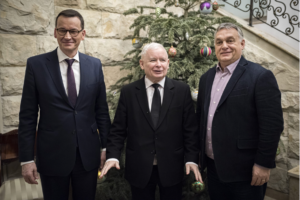
That way, the media fails to reflect popular opinion (it’s hard for citizens to form an opinion when they are only allowed to see, hear or read one side of an argument) and Orbán is able to win election after election. Whatever it is, it’s not the democracy Orbán claims it to be. In the distant past, Orbán championed liberal values and was widely seen as a ‘centrist’; recent events have shown him to be so far from the centre that he should fall off the edge. It’s all part of the growth in nationalism, espoused by Orbán and others today but seemingly on the rise worldwide. It weakens substantially Europe’s ability to play the rôle it should in international affairs. In its latest attack on democracy and moderation, Orbán’s government is still attempting to shut down the Central European University (CEU) in Budapest. Orbán doesn’t like the intelligentsia and his cronies ask students to report any professors who display left-wing views. Freedom of thought? Not in Orbán’s Hungary! Founded in 1991 by the Hungarian-American investor and philanthropist George Soros, many of its departments rank among the global top 50. Orbán, however, has refused to talk with the man who runs it, Michael Ignatieff, the human rights campaigner and opposition leader in Canada, and, as a result, the university could be forced to close. Orbán, in often somewhat hysterical articles, has accused CEU of having “foreign funding” (for which, read: funding by some person or organisation that is not extremely right-wing) and therefore “un-Hungarian”. It seems that, like other despots from history, Orbán is against intellectualism.
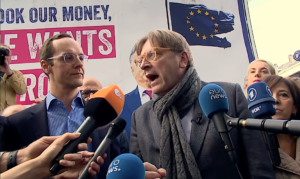
There is not a lot the EU can do about it. As Verhofstadt writes: “Once a country has gained entry to the bloc, there is little that can be done to ensure that it maintains democratic standards and upholds European values.” In Orbán’s mind, being European is purely a geographical issue and nothing to do with proper governance or humanitarian standards. “The European Commission can launch as many ‘infringement procedures’ against Hungary as it wishes,” Verhofstadt points out, “Orbán will simply ignore them with smirking pleasure.”
The only option that remains open to the EU’s ruling bodies – if they can find the courage for it – is to invoke Article 7 of the Treaty of Lisbon, agreed before anyone anticipated a far-right leader’s views gaining traction. Article 7 could ultimately remove Hungary’s voting rights. “Invoking Article 7 is not a ‘nuclear option’, as some have claimed,” Verhofstadt explained, “Rather, it is the logical response to a member-state government that has routinely violated citizens’ fundamental rights and EU values.”
The row over the influx of refugees has further weakened European solidarity, displaying the EU’s difficulty on taking join decisions in a crisis. Verhofstadt wants an extraordinary EU summit to be called for Thursday 6 August in order to address what he calls the “increasingly untenable” situation at the EU’s borders. The problem with refugees is that however much neighbouring countries may sympathise and say “tut, tut”, nobody really wants them. In a letter to the President of the European Council, Donald Tusk, Verhofstadt has described the crisis as being in need of an urgent solution. So far this year, more than 180,000 migrants have crossed the Mediterranean in order to enter EU territory. Just like those trying to reach the UK from France, it involves unsafe crossings on overcrowded boats that are barely sea-worthy, piloted by criminal gangs making money from other people’s misery and desperation. The International Organisation for Migration (IOM) has estimated that at least 2,000 people have drowned trying to reach their chosen shore. “If a reminder is at all needed that the current EU asylum and migration system is not fit for purpose,” Verhofstadt wrote, “the deaths in Calais and the Mediterranean are testimony to this.”

LET’S DO IT TOGETHER
Verhofstadt wants to see much closer cooperation among member states. He wants an EU-wide response, rather than see a handful of countries bearing much of the burden. “This must go beyond the pitiful response to the resettlement of 40,000 migrants from Italy and Greece,” he told Euractiv. The issue was supposed to have been solved with the so-called Dublin III Regulation, which came into force on 1 January 2014. It had been hammered out during the Dublin EU summit of 2013, and even as its details became clearer to the journalists who attended, some even then were raising doubts about just how effective it might prove to be, especially since the EU had been looking for a common asylum system since 1999. According to Open Migration, it’s supposed to work like this: “The asylum request by a third country national is to be presented in the first European country the person arrives in – usually, either Italy or Greece – and where he or she was identified by local authorities. This evidently means that individual preferences – that is, where people arriving into Europe actually want to go to and where do they wish to live – are bound to not be properly taken into account.” Ignored in other words. That is only the first snag, of course. The migrants had presumably dreamed of a future life for themselves and their families in the country of their own choice, not under a box-ticking exercise carried out by an anonymous clerk sitting in a distant office.
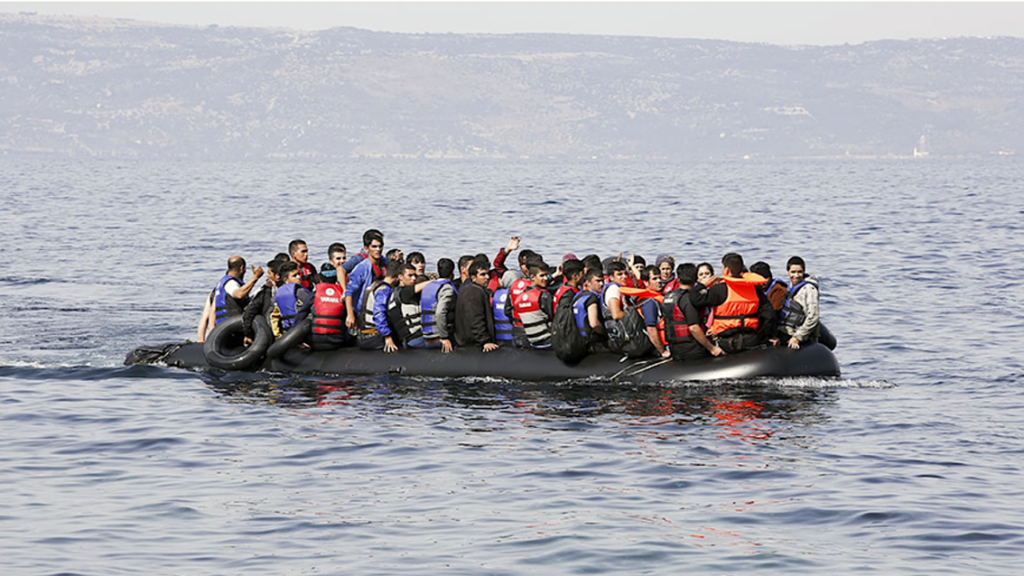
In order for this to work at all, there is a central data bank known as Eurodac where the data and fingerprints of every individual entering a European state and presenting an asylum request are registered. Using this data bank, the various authorities can trace back to find out in which State each person first entered EU territory; the person thus identified can then present an asylum request if they wish. In cases where there are no papers to present, a train ticket or receipt can be used to prove where the first entrance actually occurred. But the problem is not just with migration and asylum seeking. It’s a case of who has what power and how they choose to use it. “Soft power, like hard, is increasingly something we do together as Europeans,” wrote Verhofstadt. “Traditionally, hard and soft power go together—one cannot do without the other, or at least not for long. Of late, we have seen hard power colliding with soft power as never before.”
As Verhofstadt wrote, even Europe’s soft power is underused. “In the 2021 Global Soft Power Index there was only one mention of the European Union,” he wrote. And where was this reference? “… in the context of geographical indication protection for Parmigiano Reggiano. Yet EU influence is considerable in all seven of Brand Finance’s pillars of soft power: business and trade, governance, international relations, culture and heritage, media and communication, education and science, people, and values.” Trying to turn that into hard power is never easy, and probably not always advisable. After all, soft power has been likened to simple advertising. “The European Union needs to learn the lessons of the Ukraine crisis,” he told a conference in Dublin at Dublin Castle on the future of Europe, organised by the Institute of International and European Affairs, “and organise itself as a ‘real continental power’ in economic, financial and military terms or it faces fading into oblivion.” Perhaps a little hyperbole there, but it’s a view he feels passionately. He must scare politicians of the far right (not Orbán, perhaps, who seems to think that he alone can walk on water), because if you Google his name, by far the greatest number of hits you get are from far-right British newspapers. If he didn’t worry them, I don’t suppose they’d bother. He called for EU member states to donate a great deal of defensive military equipment to Ukraine. “The world will never be the same,” he said. “I have the same feeling today that I got after 9/11.”
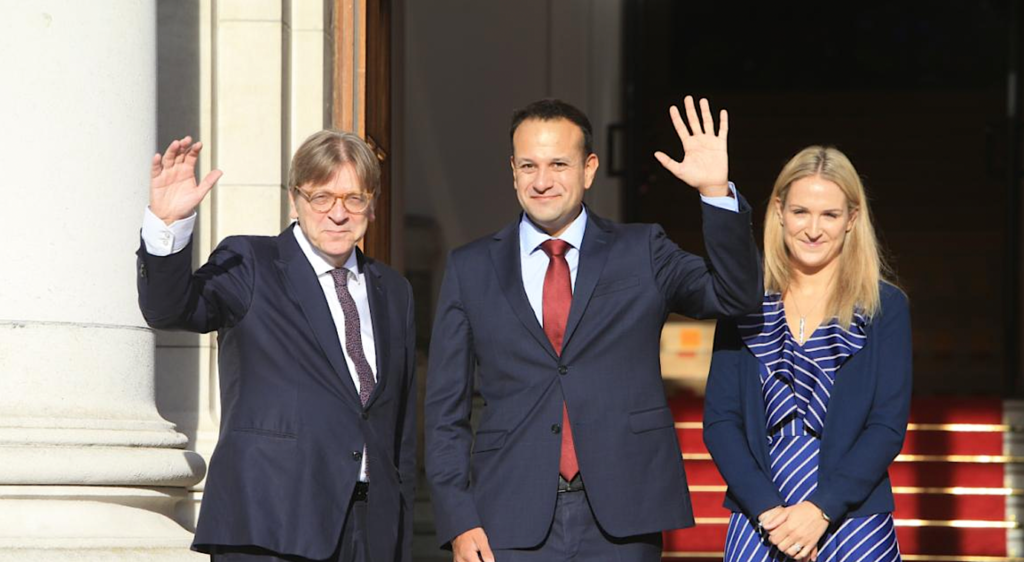
YOU CAN’T TAKE IT WITH YOU
The Irish Times quoted him as saying: “this would involve the bloc organising itself ‘as a real continental power’ in economic, financial, and military terms. That will be necessary in the world of tomorrow, which is already the world of today,” he told his audience. “That’s the world of so-called empires, super-powers, China, India, Russia, and the US. Europe has to take the lesson that we need to do a number of reforms to make it a real European Union, because it is not a union today.” It’s sadly true, and it’s also a point he has been labouring for some time. We cannot say he didn’t warn us.
Verhofstadt believes that the EU needs to unify itself further. Its current weaknesses, he has said, are preventing it from taking action “in a timely manner”. The delay on the implementation of a sanction on Russia over the SWIFT system of money transfers is an example of that, he argues, because it’s based on the principle of unanimity. “I think that a more solid, integrated, strong EU would have been a bigger threat to Putin to start such a war. Let’s take the lessons from there”, he said.
But how does the EU get there? One of Verhofstadt’s proposals, many years ago, is for the member states to form themselves into a kind of ‘United States of Europe’. Given their seeming disinclination to work together on any project that threatens their individual sovereignty, it probably isn’t possible. That was his language of 2005, but he has updated it to reflect the perilous circumstances in which Europe now finds itself. That brings us back to that conference held at Dublin Castle on the future of Europe. Dublin Castle always reminds me of the memories left behind when a conquering power takes over someone else’s country, then leaves again.
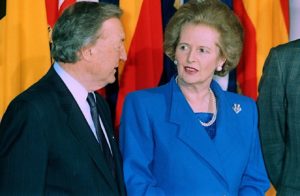
At the 1990 European Summit held in Dublin Castle, I was fortunate enough to be within earshot as the leaders were strolling out. Irish Taoiseach (Prime Minister) of the time, Charles Haughey was walking beside the then British Prime Minister, Margaret Thatcher. She said to him with a hint of pride and a sweeping hand gesture towards the ancient stone work: “See what a wonderful heritage we left behind for you.” Haughey, in what might be called a “stage whisper”, that I believe was meant for her to hear, replied: “Only because you couldn’t take it with you.” Military defeats and the imposition of foreign rule on any country causes massive and long-lasting resentment. Haughey himself seems to have been most annoyed by the poor standard of food provided by his country for the delegates and for the large flock of journalists like me trying to follow events. Normally, the food at such summit get-togethers was (and presumably still is) very good, while Haughey was a renowned gourmet who patronised Dublin’s finest dining establishments. He felt that what he described as being “only of good pub grub standard” reflected badly on Ireland.
It’s Europe’s unpreparedness that worries Verhofstadt. The EU is too slow to respond to events, even world-shattering major events. “The Americans, when the war started on 24 February, were capable immediately, three weeks after that, to launch – by an Executive Order of President Biden – an embargo on oil, on coal and on gas,” he told the European Parliament in a debate in June this year. “And they did that on 8 March, so the war started 24 February, and 8 March, by an executive order, the Americans were ready to stop the funding of the war machine of Putin.” Europe did not do as well, he reminded MEPs: “You have to compare that with the way we in Europe have handled that same issue. For us, it has taken three months to come to a conclusion.

It was on, I think, on the 4th May that Ms. von der Leyen said: ‘Yes, I have a proposal’ – two months after the Americans, and then it has taken three weeks, nearly a month, to decide on it, and it will be implemented by the end of the year.” Even then, the need for unanimity is a barrier it must overcome. As it is at present, the Polish and the Hungarian governments can simply block proposals that only they dislike or can even refuse to accept proposals their EU colleagues want unless they get something in addition. It’s a form of blackmail, in fact. That’s why there is now a petition calling for signatures that would remove the power of individual nations to impose a veto. I should mention, however, that there is another petition trying to block the first one and to defend the right of individual countries to block the entire Union. Verhofstadt is unrepentant and still pressing ahead: “Vetos are killing European unity. They lead to blackmail, ineffectiveness, loss of credibility and faith in the EU. Unanimity needs to go. It’s that simple. Sign the Petition!” he wrote on Twitter.
STAND TOGETHER OR FALL APART
Verhofstadt is insistent that the EU should show more solidarity (as well as more haste) in reacting to Russia’s aggression by hitting Putin financially as hard as possible. “Only a full oil and gas embargo can stop us financing Putin’s war machine!” he Tweeted angrily. His vision, however, although opposed by right-wing forces and sections of the media, is getting its time in the spotlight. On the 9 June, according to Verhofstadt’s Liberal “Renew” political group, the European Parliament began its move towards reforming the EU treaties.
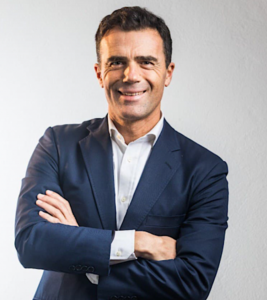
The current Treaties have been in force for a decade, in which time Europe has faced the COVID pandemic and Russia’s brutal invasion of Ukraine. The Renew bloc, in agreement with Verhofstadt, wants to ensure that one single member state is unable to stand in the way of changes intended to help the EU’s 450-million citizens. Under the new rules adopted by MEPs, the European Parliament gains the right of legislative initiative, which supporters say is “a critical asset for any parliamentary assembly and is indispensable for a genuine European democracy.”
The vote certainly met with Verhofstadt’s approval. “The citizens in the Conference on the Future of Europe called upon us,” he declared “to make Europe more effective, more tangible, more democratic.” Of course, we mustn’t forget that Viktor Orbán, who bargains financially with the media for their support, also considers himself a democrat, albeit not in a way Verhopfstadt would recognise. He, unlike Orbán, believes that the people, not their leaders, should have the final say. “We owe it to them,” Verhofstadt continued, “to implement the conclusions, even the hardest parts, where the treaties need to be updated. With this vote, the European Parliament follows up on its promise, so that the EU can fully deliver on its potential.” That view was echoed by Sandro Gozi, a French MEP and shadow rapporteur for Renew on the Parliament’s right of initiative: “A Parliament proposes, adopts laws and controls the executive,” she said after the vote. “Otherwise, it is not a Parliament. The European Parliament must enjoy a right of legislative initiative, which represents a pillar of democratic legitimacy, other than a clear request formulated by citizens during the Conference on the Future of Europe,” adding a pertinent reminder: “This issue has become even more urgent due to the return of war to our continent, requiring the emergence of a truly sovereign and democratic Europe.”
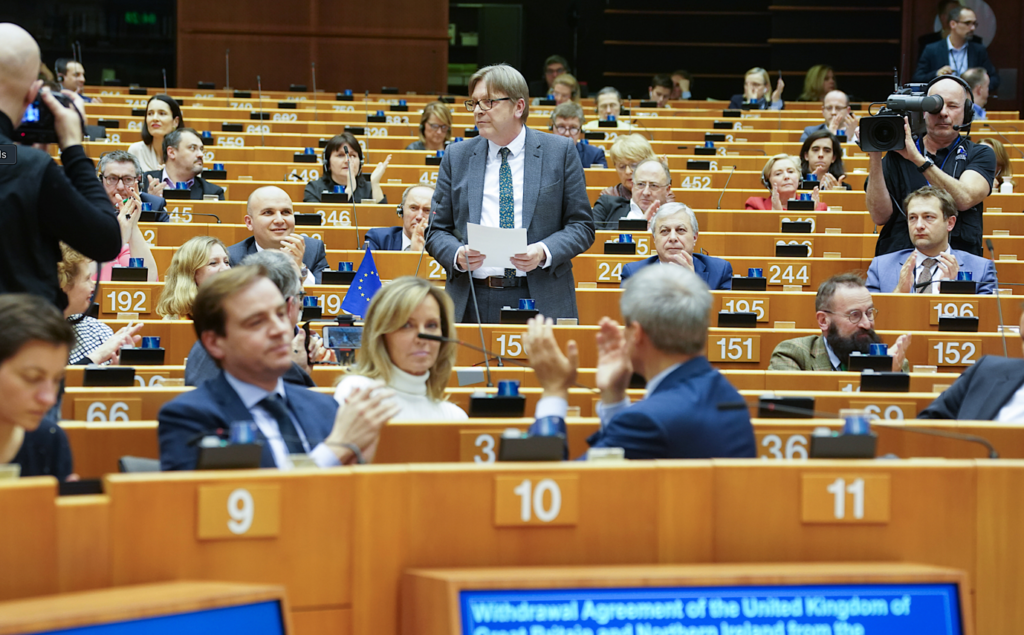
Reassuring though it would be to see the EU member states united in a cause, it’s not just because of Russian aggression that the EU needs greater coherence. We have seen and are still experiencing the effects of the CORONA-19 pandemic. Verhofstadt has pointed out that the end of the pandemic (when and if it comes) will not be the end of Europe’s difficulties. Europe must get ready for the next crisis, whatever form it may take. “The jobs and livelihoods of millions of Europeans are at stake,” he wrote on the Politico website. “Large companies have ample buffers and credit lines, but people on a modest salary, the self-employed or small company owners are at risk. The repercussions of bungling our response will be dire.” Verhofstadt is only too well aware that the EU leadership’s record on facing up to crises is somewhat patchy and could be greatly improved. “To avoid the worst,” he wrote, “Europe has to learn from its past mistakes and act quickly, decisively and with a sense of solidarity. Only by sharing the burden of this challenge do we have a chance of succeeding.” Verhofstadt is pleased that there are safety nets in place for the most vulnerable and severely affected. But that won’t be enough, he says. “Yes, our national social security mechanisms and government emergency measures will absorb some of the blow. But if we want to prevent this from turning into a new sovereign debt crisis like the one we saw in 2012 — and from which we’ve only barely recovered — we’ll have to come up with a common European approach.” It’s that “common approach” notion that seems to cause Europe so many problems. Nationalism still reigns supreme. It was this “my nation is best, forget or ignore the rest” attitude that led to Brexit and which continues to dog EU decision-making.
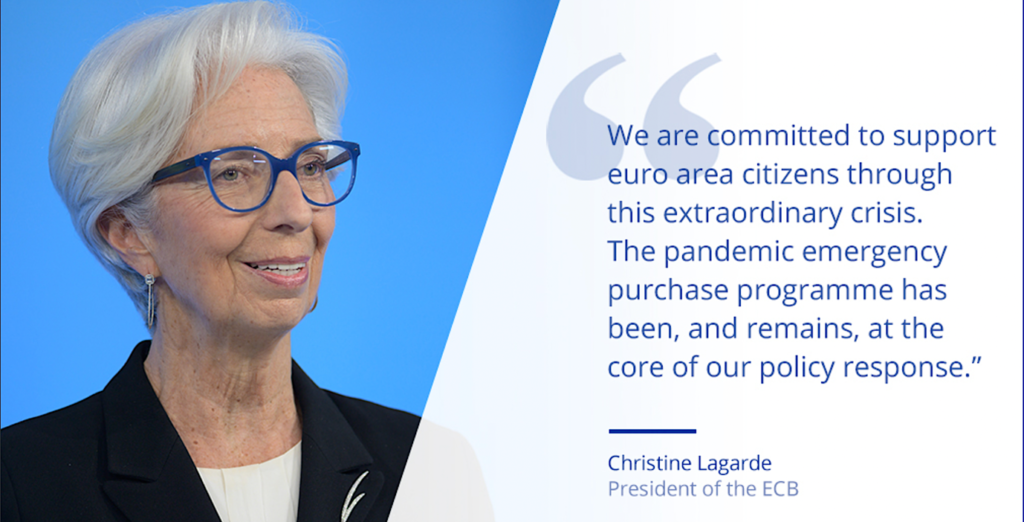
“It’s high time now that the European Commission steps in and takes responsibility for designing a common proposal that can match the coronavirus package of nearly $2-trillion being launched in the United States,” wrote Verhofstadt. “The Commission won’t have to start from scratch. The European Central Bank has already made the right move by proposing a ‘Pandemic Emergency Purchase Program’ (PEPP) of €750-billion and announcing there will be ‘no limits’ in order to keep the euro afloat and ‘the spreads’ between the cost of borrowing of heavily indebted countries and Germany’s under control. But we should not let the ECB fight this alone.” The ability to respond quickly in a crisis is the great strength of the central banks, as the economist Thomas Piketty pointed out in his book, “Capital and Ideology”. Piketty’s books are invariably brilliant, analysing economic issues with surgical precision and in a comprehensible way. “From a strictly technical standpoint,” Piketty wrote, “the Fed or the ECB could create dollars or euros worth 600% of GDP and attempt to buy all the private wealth of the United States or Western Europe. But this would raise serious issue of governance: central banks and their boards of governors are no better equipped to administer all of a country’s property than were the Soviet Union’s central planners.” Even so, there is an undoubted and unequivocal rôle for the ECB in ensuring that Europe is prepared for the next disaster, whatever it may turn out to be. According to Piketty, the balance sheet of the ECB in 2019 (the date of publication) was 40% of the Eurozone’s GDP, but this still only equates to 4% of the financial assets in circulation.
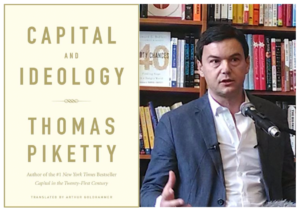
Verhofstadt points out that the European Commission: “should be the one to develop the initiative to first stabilize and then assist the recovery of our public finances and our economies,” adding that the size of that initiative will have to be much bigger than the €250-billion the Eurogroup wants to mobilize through the European Stability Mechanism, the intergovernmental organisation established by the member states of the euro area in 2012, with the mission to enable the countries of the euro area to avoid and overcome financial crises and to maintain long-term financial stability and prosperity. Not an easy balancing act. Verhofstadt adds a warning with regard to speed: “Let ‘s not make the same mistake we did in 2008 by being reluctant and slow to react. That approach – which was too little, too late – made the economic crisis in Europe much longer and more painful than it had to be.” As it is, it’s estimated that the pandemic has so far cost the EU some €1-trillion, or around 8% of GDP. Verhoftstadt believes it should now try to mitigate the damage by launching a European Stability and Recovery Programme (ESRP)worth €1-trillion. Part of that – the “stability” part – would take the form of loans for countries whose economies are in trouble. The rest of it, the “recovery” part, could provide bridge and investment credits to the “real” economy. Verhofstadt proposes a new “Euro Safe Assets or Recovery bond”, backed by some kind of what he calls “a pan-European guarantee”, based on a reformed EU budget. Whether or not Verhofstadt will ultimately get not only his “right on initiative” reforms but also his economic reforms remains to be seen, although the signs look promising.
As Thomas Piketty argues, it’s in all of our interests to make ourselves aware of what is happening, despite the massive complexity of economics at the scale we’re talking about. “Their complexity is such that it is unjustifiable to abandon them to a small caste of experts,” he wrote. “The contrary is true. Precisely because they are so complex, only broad collective deliberation, based on reason and on the past history and experience of every citizen, can lead to progress toward resolving these issues.” I think Verhofstadt would agree with that verdict; Europe must not only be ready, but it must have worked out how to put in place measures to offset the worst effects. A Europe that really works: wouldn’t that be nice?
